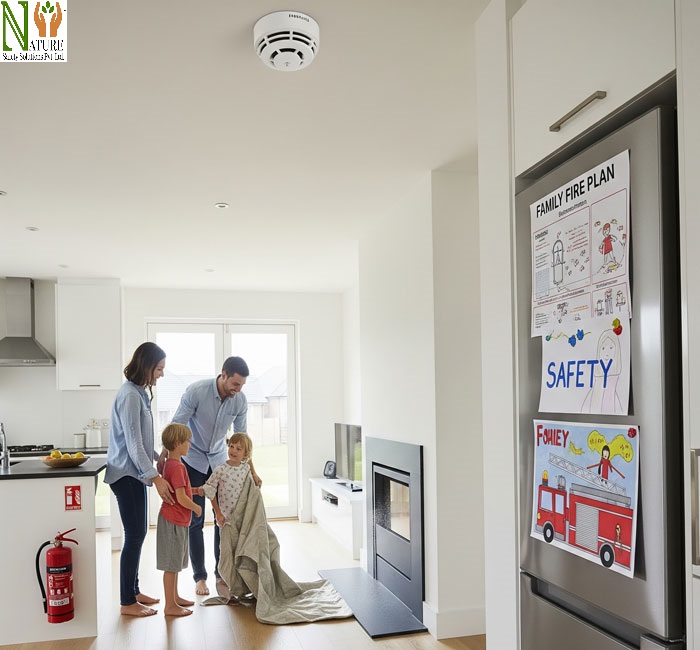A fire at home can break out in seconds and destroy everything in its path—your home, your belongings, and even lives. Every year, thousands of house fires occur due to small mistakes, many of which are preventable.
Simple habits like turning off appliances, being careful in the kitchen, and planning an escape route can make a big difference. Fire safety isn’t just about having the right equipment—it’s about daily choices and awareness. In this article, we’ll look at some easy but powerful habits that can protect your home and save lives.

Install Smoke Alarms and Test Them Regularly
Smoke alarms are the first line of defense in a fire emergency. They alert you to danger early, giving you more time to escape safely.
Place smoke alarms in every bedroom, outside sleeping areas, and on every floor of the home. Test them once a month by pressing the test button.
Change the batteries once a year or when the device starts beeping. If your smoke alarm is over 10 years old, replace it. A working smoke alarm can reduce the risk of fire-related death by half.
Be Extra Cautious While Cooking
Most home fires start in the kitchen. Cooking accidents, especially when frying or grilling, are one of the top causes of fire-related injuries.
Never leave cooking food unattended. Stay in the kitchen and keep an eye on the stove. Turn off burners if you need to step away. Keep towels, paper, and curtains away from the stove.
Use the back burners when possible, especially if you have children. If a grease fire starts, don’t throw water on it—cover the pan with a lid or use a fire extinguisher.
Use Electrical Appliances Safely
Faulty electrical wiring or damaged appliances are another major cause of home fires. Check cords for damage and don’t use appliances with frayed wires. Don’t overload outlets or extension cords. Unplug devices when not in use.
Avoid running wires under carpets or furniture, as this can cause overheating. If you live in an old house, consider getting the wiring inspected by a professional electrician.
Be Careful with Heaters and Fireplaces
During colder months, space heaters and fireplaces help keep us warm—but they can also be dangerous.
Always place heaters at least three feet away from anything that can catch fire, such as furniture, curtains, or blankets. Turn them off when leaving the room or going to sleep.
For fireplaces, use a screen to prevent sparks from flying out. Get chimneys cleaned at least once a year to prevent the build-up of flammable material.
Store Flammable Items Properly
Many everyday items in the home are flammable, including cleaning products, paint, and cooking oils. Keep these materials in their original containers and store them in a cool, dry place away from heat sources.
Do not smoke near these substances, and never store gasoline or propane inside your home. Even common items like air fresheners or nail polish remover can become dangerous if not handled correctly.
Create a Fire Escape Plan
Having a fire escape plan can save lives. Everyone in your home should know what to do and where to go if a fire starts. Make a plan that shows two ways out of every room.
Choose a meeting spot outside the house, like a tree or mailbox. Practice the escape plan twice a year, including at night. Teach children how to stay low and crawl under smoke. Also, teach them how to stop, drop, and roll if their clothes catch fire.
Keep a Fire Extinguisher at Home
Having a fire extinguisher can help you put out small fires before they spread. Keep extinguishers in key areas like the kitchen, garage, and near any heating equipment.
Make sure everyone in your home knows how to use it. The PASS method is easy to remember: Pull the pin, Aim at the base, Squeeze the handle, and Sweep side to side.
Avoid Smoking Indoors
Smoking inside the house is risky, especially if you fall asleep with a lit cigarette. If you smoke, do it outside. Use sturdy ashtrays and make sure cigarette butts are completely out before throwing them away. Never smoke near oxygen tanks, gas stoves, or flammable materials. Keep matches and lighters out of children’s reach.
Educate Your Family, Especially Children
Teaching your family about fire safety is one of the best things you can do. Talk about fire risks and safety rules regularly. Show kids how to call emergency numbers and explain what a smoke alarm sounds like. Make sure they understand not to hide during a fire but to go outside quickly and safely.\
Also read:
